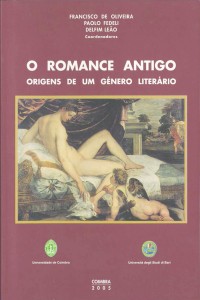Please use this identifier to cite or link to this item:
https://hdl.handle.net/10316.2/39249| DC Field | Value | Language |
|---|---|---|
| dc.contributor.author | Ferreira, Paulo Sérgio | |
| dc.date.accessioned | 2016-08-02T16:12:20Z | |
| dc.date.accessioned | 2020-09-08T18:15:00Z | - |
| dc.date.available | 2016-08-02T16:12:20Z | |
| dc.date.available | 2020-09-08T18:15:00Z | - |
| dc.date.issued | 2005 | - |
| dc.identifier.isbn | 972-9057-21-4 | |
| dc.identifier.isbn | 978-989-26-1229-4 (PDF) | |
| dc.identifier.uri | https://hdl.handle.net/10316.2/39249 | - |
| dc.description.abstract | The relation between Trimalchio and his slaves in the Satyricon, given its detailed analysis, becomes a unique example of the treatment that the freedmen of the first century A.D. used to give to their ancient equals. It allows, also, the delineation of a more precise idea about the parvenu's philanthropy: almost all sympathetic attitudes toward his slaves are dictated by the host’s obsession with the monopolization of the conversations, with the astonishment of the guests through staged intermezzi and with his own death. That’s why, in this respect, Trimalchio’s humanitas presents obvious limitations. Considered in its formal and structural perspective, the parody of Seneca’s Ep. 47.1, in Petr. 71.1, confirms the absence of urbanitas - traditional part and constituent of the humanitas -, and the Petronian concern, when drawing his character, with the obedience to the Aristotelian and Horadan principle of appropriateness. In its ideological and contextual frame, this parody implies three deeply different persons: one tries to conciliate Stoic philosophy with political and social concerns; the other, Trimalchio, not dispelling means, exhibits his egocentrism; and the third one, Petronius, in a very discrete death fiction, shows perhaps his disbelief in human capacity of making long-term projects and in trying to improve such an unstable and unfair world like the Roman one of the first century A.D. | eng |
| dc.language.iso | por | - |
| dc.publisher | Centro de Estudos Clássicos e Humanísticos | por |
| dc.relation.ispartof | http://hdl.handle.net/10316.2/39242 | por |
| dc.rights | open access | - |
| dc.title | O uso paródico e satírico do tema da escravatura na Cena petroniana | por |
| dc.type | bookPart | por |
| uc.publication.firstPage | 87 | - |
| uc.publication.lastPage | 104 | - |
| uc.publication.location | Coimbra | por |
| dc.identifier.doi | 10.14195/978-989-26-1229-4_7 | - |
| uc.publication.digCollection | PB | por |
| uc.publication.orderno | 7 | - |
| uc.publication.area | Artes e Humanidades | por |
| uc.publication.bookTitle | O romance antigo: origens de um género literário | - |
| uc.publication.manifest | https://dl.uc.pt/json/iiif/10316.2/39249/206019/manifest?manifest=/json/iiif/10316.2/39249/206019/manifest | - |
| uc.publication.thumbnail | https://dl.uc.pt/retrieve/11091546 | - |
| uc.publication.parentItemId | 54632 | - |
| uc.itemId | 69220 | - |
| item.grantfulltext | open | - |
| item.fulltext | With Fulltext | - |
| Appears in Collections: | O romance antigo: origens de um género literário | |
Files in This Item:
| File | Description | Size | Format | |
|---|---|---|---|---|
| o_uso_parodico_e_satirico_do_tema.pdf | 14.05 MB | Adobe PDF |  |
Items in DSpace are protected by copyright, with all rights reserved, unless otherwise indicated.
